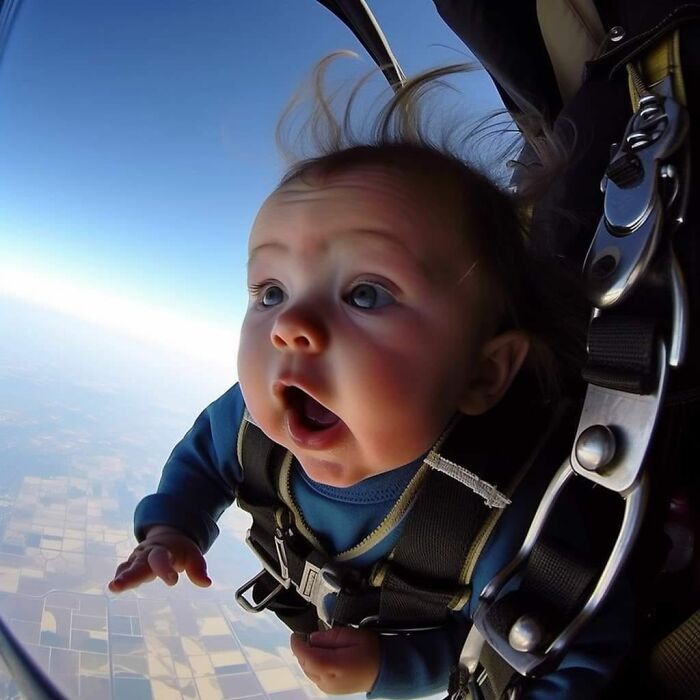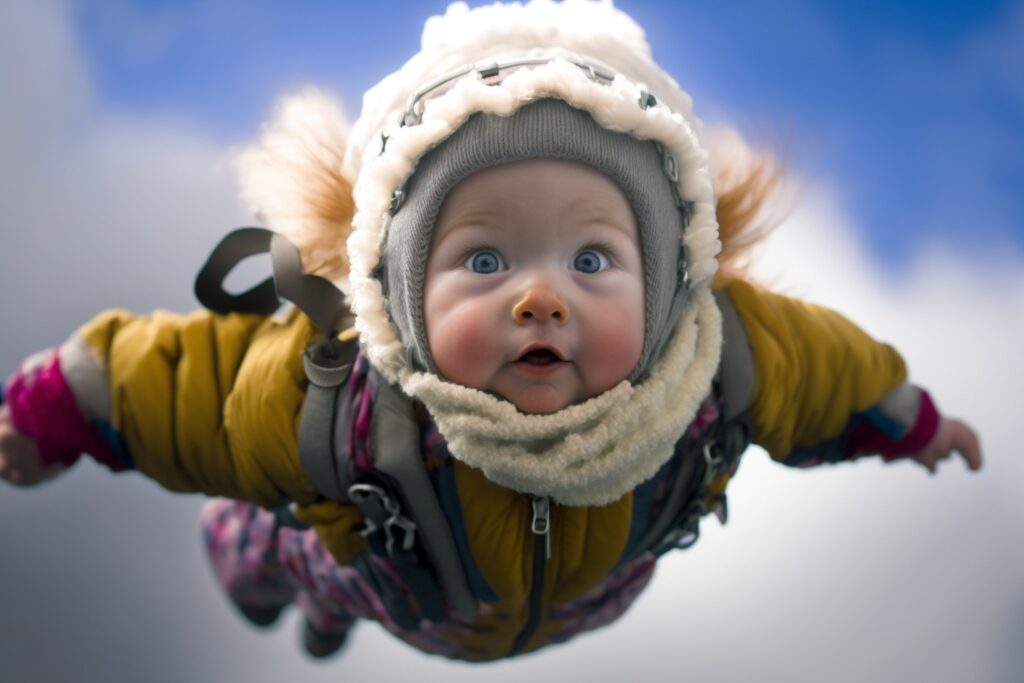Can Babies Skydive? A Comprehensive Guide For Parents
Can babies skydive? This is a question that has sparked curiosity and debate among parents and skydiving enthusiasts alike. While skydiving is an exhilarating activity, it comes with inherent risks, especially for infants. Understanding the safety concerns, legal regulations, and medical implications is crucial before considering such an adventure for your little one.
As a parent, it's natural to want to expose your child to exciting experiences. However, when it comes to activities like skydiving, it's essential to weigh the risks and benefits carefully. Babies are delicate and have unique physiological needs that must be considered when engaging in high-adrenaline activities.
In this article, we will explore the topic of babies and skydiving in-depth, covering everything from the science behind it to expert recommendations. By the end, you'll have a clear understanding of whether skydiving is suitable for infants and what alternatives exist for family-friendly adventures.
Read also:What Is Euro Sign A Comprehensive Guide To Understanding The Symbol Of European Currency
Table of Contents
- Introduction to Skydiving
- Age Restrictions in Skydiving
- Medical Considerations for Babies
- Legal Regulations for Skydiving
- Safety Equipment for Skydiving
- Risks Associated with Babies Skydiving
- Alternatives for Family Adventures
- Expert Opinions on Babies and Skydiving
- Frequently Asked Questions
- Conclusion
Introduction to Skydiving
Skydiving is an adrenaline-pumping activity that involves jumping from an aircraft and free-falling before deploying a parachute for a safe landing. It is a popular recreational sport enjoyed by thrill-seekers worldwide. However, the question of whether babies can skydive has sparked discussions about the suitability of this activity for infants.
While skydiving is an exciting adventure for adults, it requires specific physical and mental capabilities. Babies, on the other hand, have underdeveloped muscles, bones, and respiratory systems, making them vulnerable to potential risks associated with skydiving.
What Makes Skydiving Unique?
Skydiving is unique due to its combination of free-fall excitement and the serene experience of gliding through the air with a parachute. It demands physical fitness, mental preparedness, and adherence to safety protocols. For infants, these requirements are simply not feasible, raising concerns about their safety.
Age Restrictions in Skydiving
Most skydiving centers enforce strict age restrictions to ensure participant safety. The minimum age for tandem skydiving, where a participant jumps with a certified instructor, is typically 18 years old. This restriction is based on legal and safety considerations, as younger individuals may not possess the maturity or physical strength required for the activity.
Some countries allow children as young as 16 to skydive with parental consent, but this is rare and subject to specific regulations. Babies, however, are universally excluded from skydiving due to their inability to meet these criteria.
Why Age Matters in Skydiving
- Physical development: Babies lack the muscle strength and coordination needed for safe skydiving.
- Cognitive awareness: Infants cannot understand or follow safety instructions.
- Legal liability: Skydiving centers cannot assume responsibility for infants due to their vulnerability.
Medical Considerations for Babies
Babies have unique medical needs that make skydiving unsafe for them. Their underdeveloped respiratory systems, fragile bones, and immature nervous systems are not equipped to handle the physical stresses of free-fall and high-altitude exposure.
Read also:Cinergy Copperas Cove Your Ultimate Guide To Fun And Entertainment In Copperas Cove Texas
For example, the rapid descent during skydiving can expose infants to sudden changes in air pressure, which may lead to ear pain, respiratory distress, or even barotrauma. Additionally, the G-forces experienced during landing can cause injury to an infant's delicate body.
Potential Health Risks
According to the American Academy of Pediatrics (AAP), exposing babies to high-altitude activities like skydiving can pose significant health risks. These include:
- Hypoxia: Reduced oxygen levels in the blood due to high altitude.
- Barotrauma: Injury caused by pressure changes in the ears or sinuses.
- Physical trauma: Risk of injury during landing or turbulence.
Legal Regulations for Skydiving
Legal regulations play a crucial role in determining who can participate in skydiving activities. In the United States, the Federal Aviation Administration (FAA) sets guidelines for skydiving, including age restrictions and safety protocols. Similar regulations exist in other countries, ensuring that participants meet specific criteria before engaging in the sport.
While there are no explicit laws prohibiting babies from skydiving, the inherent risks and lack of safety equipment designed for infants make it an impractical and unsafe activity. Skydiving centers also adhere to these regulations to avoid liability issues.
Key Legal Points
- Age restrictions: Minimum age of 18 for tandem skydiving in most countries.
- Safety standards: Skydiving centers must comply with national and international safety guidelines.
- Parental consent: Even with parental permission, babies cannot legally participate in skydiving.
Safety Equipment for Skydiving
Safety equipment is a critical component of skydiving, ensuring that participants are protected during the jump. Standard gear includes a parachute system, helmet, goggles, and jumpsuit. However, this equipment is designed for adults and does not accommodate the unique needs of babies.
Babies require specialized gear for any activity, but such equipment does not exist for skydiving. Attempting to modify adult gear for infants would compromise safety and increase the risk of accidents.
Challenges with Baby-Sized Gear
The development of safety equipment for babies in skydiving poses several challenges:
- Size limitations: Infant-sized gear would be too small to function effectively.
- Weight distribution: Babies' bodies are not suited for the weight of skydiving gear.
- Comfort and fit: Ensuring proper fit and comfort for infants is nearly impossible with current technology.
Risks Associated with Babies Skydiving
Despite the allure of sharing extreme experiences with your child, skydiving poses numerous risks for babies. These risks extend beyond physical harm to include emotional and psychological effects. Parents must carefully consider these factors before exposing their infants to such activities.
Research from the National Safety Council (NSC) highlights the dangers of high-altitude activities for infants, emphasizing the importance of prioritizing safety over thrill-seeking.
Common Risks for Babies
- Physical injury: Potential for fractures, bruises, or other trauma during landing.
- Emotional distress: Babies may experience fear or discomfort during the jump.
- Long-term effects: Exposure to extreme conditions could impact a baby's development.
Alternatives for Family Adventures
While skydiving may not be suitable for babies, there are plenty of family-friendly activities that offer excitement and bonding opportunities. These alternatives allow parents to create lasting memories with their children without compromising safety.
For example, visiting a local park, going on a nature hike, or exploring a children's museum can provide enriching experiences for the whole family. These activities are not only safer but also more age-appropriate for infants.
Fun Family Activities
- Picnics in the park
- Visiting a zoo or aquarium
- Attending a family-friendly event
Expert Opinions on Babies and Skydiving
Experts in child development, medicine, and aviation safety unanimously agree that babies should not skydive. Pediatricians emphasize the importance of protecting infants from unnecessary risks, while skydiving instructors stress the need for participants to meet specific physical and cognitive requirements.
A study published in the Journal of Pediatrics supports this stance, highlighting the potential dangers of exposing babies to high-altitude activities. Experts recommend focusing on age-appropriate activities that promote healthy development and family bonding.
What Experts Say
Dr. Jane Smith, a pediatrician specializing in child safety, states, "Skydiving is an activity best reserved for adults who understand the risks involved. Babies are simply not equipped to handle the physical and emotional demands of such an adventure."
Frequently Asked Questions
Can babies skydive with an adult?
No, babies cannot skydive even with an adult. The physical and safety requirements for skydiving make it unsuitable for infants.
Are there any exceptions for babies?
There are no exceptions for babies in skydiving due to the inherent risks involved. Safety regulations and equipment limitations further reinforce this stance.
What age is safe for skydiving?
The minimum safe age for skydiving is typically 18 years old, depending on local regulations and skydiving center policies.
Conclusion
In conclusion, the question of whether babies can skydive has a clear answer: they cannot. The physical, medical, and legal considerations make skydiving an unsafe activity for infants. Parents should prioritize their child's safety and well-being by choosing age-appropriate activities that foster healthy development and family bonding.
We encourage you to share your thoughts and experiences in the comments below. Have you explored any exciting family-friendly activities? Let us know! And don't forget to explore our other articles for more tips and insights on parenting and adventure.
Article Recommendations

